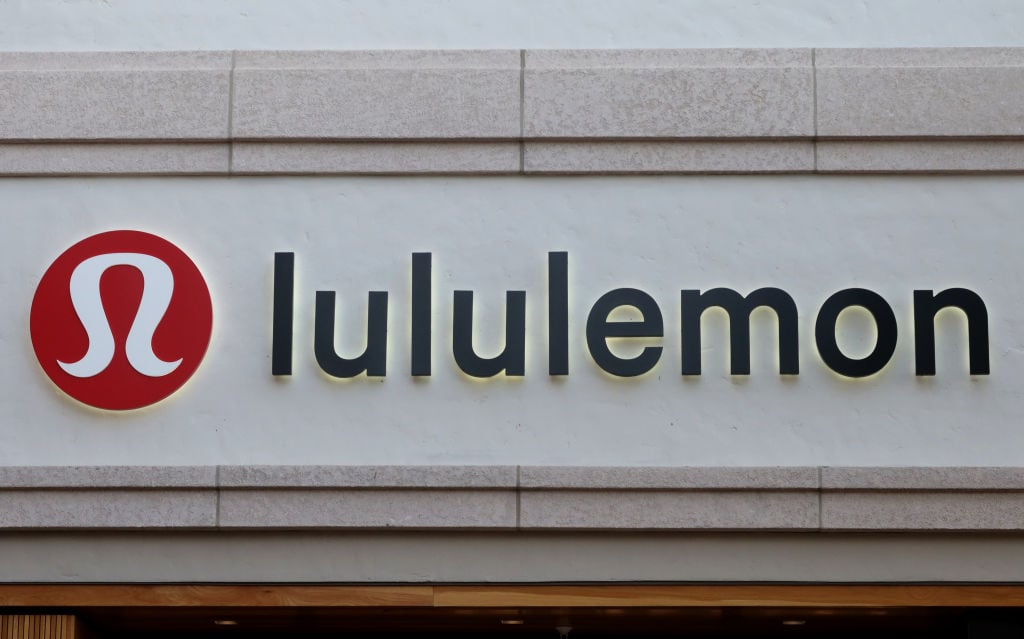While tech stocks have carried the stock market higher over the past few years, other sectors of the economy have not fared as well. This is particularly evident among beaten-down stocks in the consumer discretionary sector. If you have some extra cash you don't need for paying bills or other expenses, here are three stocks of growing consumer brands to buy on the dip.

Image source: Getty Images.
1. Lululemon Athletica
Shares of Lululemon Athletica (LULU 0.88%) are trading at their lowest valuation in a long time. At a forward price-to-earnings multiple of 13, it's difficult to see how a patient investor won't make money on this stock over the next five years.
Lululemon has demonstrated durable brand power for over 20 years. It began as a single retail space inside a local yoga studio in Vancouver in 1998, but has since expanded to 784 stores worldwide. It is still finding plenty of room for growth, with international sales up 22% in the recent quarter. Strong global growth shows that new people discovering the brand outside of the Americas love the product.

NASDAQ: LULU
Key Data Points
The problem has been slowing sales growth in North America. While management has successfully navigated shifting customer preferences to triple its revenue over the past six years, it acknowledges that it hasn't introduced enough new styles to sustain strong customer demand. However, management is addressing this problem and plans to rebalance its assortment by early next year. It is also dealing with headwinds in the form of tariffs and higher costs, which are expected to result in an 11% decline in earnings this year.
In fiscal Q2, which ended Aug. 3, Lululemon reported a year-over-year revenue increase of 6% on a constant-currency basis, which is well below its five-year quarterly average growth rate of 25%. It's uncertain whether Lululemon can return to those high double-digit growth rates again; however, there is still sufficient opportunity in the $400 billion athletic apparel market for revenue to grow at a rate faster than 6%.
Lululemon has a solid balance sheet with $1.1 billion of cash and no debt, providing a cushion to navigate short-term struggles. The current share price is more than likely undervaluing the long-term prospects of this excellent brand.
2. Deckers Outdoor
With shoppers pulling back on spending, Deckers' (DECK +1.35%) popular brands, such as Ugg and Hoka, have experienced slowing sales growth. This company has delivered two decades of exceptional shareholder returns, but new investors now have the opportunity to purchase the stock at an attractive discount.

NYSE: DECK
Key Data Points
Investors can't know for certain when consumers will feel good enough about their financial position to spend again. However, from a long-term perspective, buying shares of top brands during an economic downturn can yield attractive returns. Deckers' sales in the first half of the year grew 12% year over year, indicating the brand's long-term growth potential is undervalued.
Hoka sales grew 15% year over year through the first half of the year, while Ugg's rose 12%. International sales were the highlight, with sales surging 38%. Management credits these results to marketing efforts and new customers discovering its brands.
Lululemon and Deckers are showing similar patterns. There is strong sales momentum in international markets, but weakness in the U.S. market. This also suggests that soft sales performance is not due to brand weakness, but rather to macroeconomic issues that will eventually pass. With earnings up 17% year over year through the first half of the year, the stock offers excellent value, trading at just 12 times next year's consensus earnings estimate.
3. Dutch Bros
Shares of Dutch Bros (BROS 3.99%) surged to new highs earlier this year, only to fall 35% from its recent highs. This is a promising drive-thru chain serving coffee and other specialty beverages across over 1,000 locations, offering a significant long-term opportunity to expand to several thousand locations across the U.S. The stock is an excellent buy after falling 35% below its previous peak.

NYSE: BROS
Key Data Points
Dutch Bros is expanding quickly but in a disciplined manner. It has been opening 30 or more shops each quarter this year, which has kept its quarterly revenue increasing by at least 25% year over year. Importantly, it turned free-cash-flow-positive toward the end of 2024, indicating improving shop-level profitability as it continues to expand.
It's a good bet most Americans will be as familiar with Dutch Bros in another 20 years as they are with Starbucks. Management plans to expand to 2,029 locations by 2029, but over the long term, they see potential for as many as 7,000 shops.
The company is building a loyal customer base, with record sales at new shops and long customer lines. Even at this early stage of growth, management is already testing new menu options, such as food, to encourage repeat visits and increase revenue opportunities. The recent dip presents an opportunity to acquire shares at a more reasonable price-to-sales multiple of 4.6. This is a fair valuation to invest in a strong consumer brand in the making.






